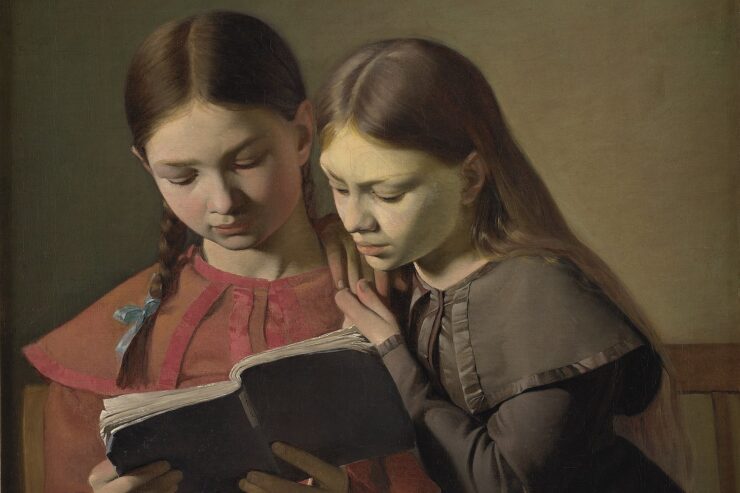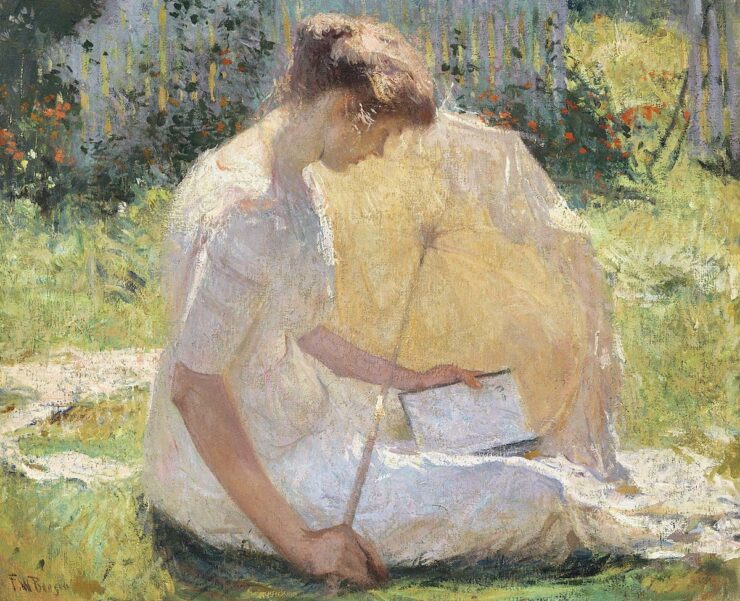When I realized I was 60 pages from the end of Gregory Maguire’s The Witch of Maracoor, I kind of didn’t know what to do with myself. I put the book down and walked away. I didn’t pick up anything else. I wasn’t trying to replace it. I just… needed a minute.
It took me a few days to figure out why this was—why I kept getting teary at innocuous moments; why I was sometimes in a hurry to get to the end and then, suddenly, dreading the ending. Why was this book, this book at this moment, doing such things to me, emotionally?
That’s when I remembered: I’ve been reading about Elphaba Thropp and her family, off and on, for close to 30 years. Decades! Do you know what it’s like to find yourself spending time with characters you met when you were practically a whole different person?
You probably do. You probably have a series—or more than one—that you’ve been reading that long, too.
We fantasy readers are familiar with patiently waiting for the next massive tomes in beloved series—and, to be honest, waiting for those books not so patiently. The years stretch on, and before you know it you’re asking yourself, Has it really been a decade? On the other hand, there are series that appear one right after the other, a book a year like clockwork or magic. Those are a gift, only a small amount of patience required. Knowing when the next book is coming is so satisfying.
But there is something to be said for the series we really, truly grow up with.
My love of Oz started when I was very small, so long ago that I no longer remember if it was the movie or the books that came first for me. (Those of us of a certain age might remember when The Wizard of Oz appearing on network TV each year was an event unto itself.) I read every Oz book, and more than once; I can still, probably, tell you the plots of most of them. (I’m also still weirded out by the flatheads, though Glinda of Oz is one of my favorites.)
L. Frank Baum’s Oz is not Gregory Maguire’s Oz, but they’re connected. How could they not be? There’s a Wizard in both of them, and he’s not the greatest guy no matter how you slice it. There’s a witch, a Lion, an Ozma, flying monkeys, and so much more; there’s a story about grief that quietly carried me through one of the most difficult times in my life. I was no Elphie, but I was a college student in mourning, and over the years I returned to her story again and again, seeing something in it that I couldn’t name: Conviction, maybe. Her absolute determination to move through the world the way she needed to. That was part of the person I’d lost, and I needed to find it somewhere else.
I read the sequels, loved them for their own reasons, and went back to Elphaba’s story when I needed her. I couldn’t guess how many times I’ve reread Wicked. I hope it’s a magic number.
And then, two years ago, along came Rain, Elphie’s amnesiac granddaughter, in Maguire’s unexpected sequel trilogy. Very different books, but there’s something in the genes—something that goes beyond their shared green skin. Some deep understanding of the weight of first love, some ability to trust and follow a young protagonist who feels everything so deeply that she runs away from all those feelings.
It’s a little bit like time travel, going back to the life of a twenty-ish green girl with a broken heart.
I know there are other series like this. Some of you started A Song of Ice and Fire in the 1990s, surely; how much have you changed as those characters age, and stall out, and move forward again? What of the readers of Megan Whalen Turner’s The Thief, who found the tale picking up again in 2017, more than 20 years after it began? The Wheel of Time rolled out over more than two decades. How many lives changed, and how drastically, while those pages turned? How does a story like that, if we read it over all those years, seep into our lives? What must it have been like to find Tehanu if you read the first three Earthsea books as they arrived?
Buy the Book


Mislaid in Parts Half-Known
Sometimes, you wind up reading a years-long saga in one summer, and that’s its own, specific, intense experience. (I read the first four Song of Ice and Fire books in a matter of weeks. I’m not sure I recommend it.) Some of the long ones fall by the wayside, too; after my teens, I lost track of so many fantasy series that I’d been entirely committed to as a younger reader.
But some stick. I read Robin Hobb’s Assassin’s Apprentice in college, when I bought a mass market paperback edition at Barnes & Noble (and missed my stop on the subway, absolutely absorbed by it on the way home). I’ve admitted before that I’m still waiting to finish the series, perpetually emotionally unprepared for Assassin’s Fate. (Maybe when I know what Hobb is writing next, I’ll be brave enough.) Those characters, when I revisit the books, feel like they live right under my skin, rising to the surface of memory as I read. Do I pass on books in which bad things happen to dogs in part because of certain of Fitz’s experiences? Entirely possible. Do I watch the waves a different way, thinking of serpents and liveships, than I would if I’d never met them?
Every book has the potential to stay with a reader; every story has the potential to change and shape us. But these long-running stories, the ones we spend years alongside—they make for a different kind of experience, and one I find hard to put into words. I feel, in a way, like Elphie has been keeping me company all these years, and especially in November, when my own griefs and losses sit most heavily. Even as Maguire’s Oz books stepped further and further from Elphaba’s story, they all existed because of her, each character walking through Oz in her wake.
Because of that, Rain’s story—begun in The Brides of Maracoor and finished, last month, in The Witch of Maracoor—felt like a gift. A way to remember and step forward at the same time, rather like Rain does. The series is odd and dreamy, amnesiac and inventive, and full of what Maguire calls ephrarxis, which he defines as “nostalgia for something that had never been.” It’s an awfully good way to describe the feeling a person might have about a book they read years ago—a book, a series, a world they’re still reading about, a story they’re still experiencing. Nostalgia for something that had never been, yet continues every time we turn the page again.
Molly Templeton lives and writes in Oregon, and spends as much time as possible in the woods. Sometimes she talks about books on Twitter.














